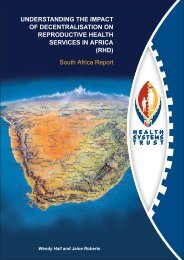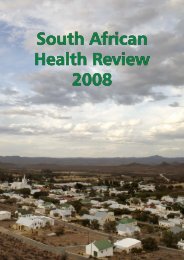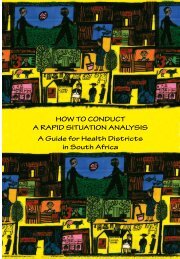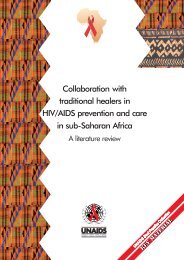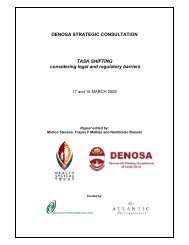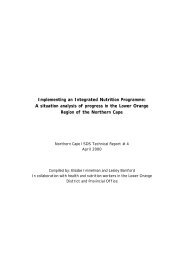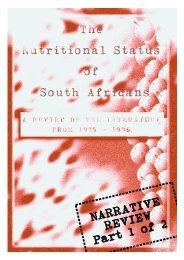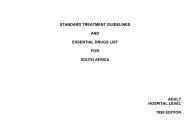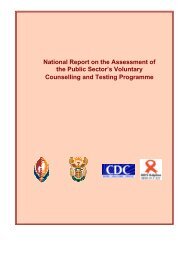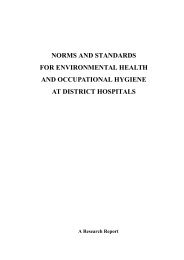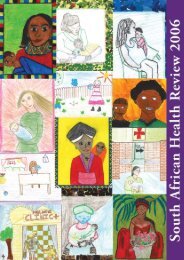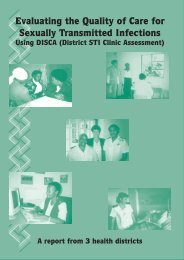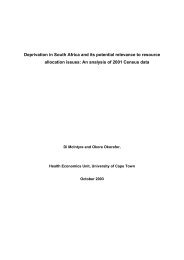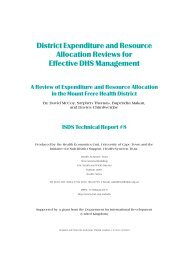SAHR 2007 - Health Systems Trust
SAHR 2007 - Health Systems Trust
SAHR 2007 - Health Systems Trust
Create successful ePaper yourself
Turn your PDF publications into a flip-book with our unique Google optimized e-Paper software.
development of novel agents once proof of concept has<br />
been established.<br />
The Innovation Fund has supported the development of a<br />
technology platform to develop new medicines, based on<br />
indigenous plants and local knowledge for the treatment<br />
of immune modulation and a number of diseases including<br />
malaria, tuberculosis and diabetes mellitus. The MRC<br />
Research Unit is one of the partners in this initiative.<br />
The South African Research Chairs Initiative of the Department<br />
of Science and Technology and the National Research<br />
Foundation have appointed a new Chair in Indigenous<br />
<strong>Health</strong> Care <strong>Systems</strong> Research, based the University of<br />
KwaZulu-Natal (UKZN). This is a strategic initiative, which<br />
aims to stimulate strategic research across the knowledge<br />
spectrum, thereby increasing the level of excellence in<br />
research areas of national and international importance.<br />
mentary medicines occurred in pharmacies and 20% in<br />
health food stores. At the time there were 250 health food<br />
stores and 2 500 pharmacies stocking complementary<br />
medicines. 15 The balance of the market was made up of<br />
some 600 supermarkets, chain stores and toiletry discount<br />
outlets. Despite the lack of comparative data, it would seem<br />
that the amount spent on medicines is considerably higher<br />
than the total amount spent on practitioners. This would be<br />
in line with worldwide trends towards self-medication using<br />
complementary medicine.<br />
An expanded MediCAMS Index was published in 2003 as a<br />
reference book for pharmacists, doctors, CAMs practitioners<br />
and health care funders. 23 The Index outlines the dosage<br />
and side-effects of all herbal remedies, homeopathics,<br />
natural medicines and dietary supplements available in<br />
South Africa.<br />
Consumer use of complementary<br />
medicines and health products<br />
Complementary medicines are currently widely available in<br />
pharmacies and health shops than in 1994 when products<br />
were typically only available in specialised shops.<br />
The HPA was formed in 1978 as an association of manufacturers,<br />
importers and distributors of complementary<br />
medicines and health products. The HPA Self-Monitoring<br />
Technical Committee assists in maintaining ethical standards<br />
of production, quality control, marketing and advertising<br />
within the industry and in the market place and ensures<br />
that good manufacturing procedures are implemented by<br />
manufacturing concerns subject to the legislative controls of<br />
the DoH.<br />
The HPA has undertaken several surveys of the turnover of<br />
their members. A 1996 survey established that the combined<br />
turnover of members was R0.881 billion while a 2003 survey<br />
showed a 53% increase to sales revenue of R1.348 billion. In<br />
2003, the market for complementary medicines and health<br />
products at consumer level was approximately R1.9 billion<br />
compared to the total medicine expenditure by medical<br />
schemes which was R8.6 billion. The survey results are<br />
summarised in Table 3.<br />
Integration of traditional and<br />
complementary medicine with<br />
public health<br />
The development and empowerment of traditional healers to<br />
play a meaningful and significant role in health care service<br />
delivery in South Africa forms one of the strategic objectives<br />
of a number of institutions in South Africa, including but<br />
not limited to the Nelson R Mandela School of Medicine at<br />
the UKZN, the MRC Municipalities, provincial DoHs and a<br />
number of non-governmental organisations.<br />
The Nelson R Mandela School of Medicine has established<br />
strong relationships with traditional healers leading to the<br />
signing of a memorandum of understanding with traditional<br />
healers in KZN. The relationships are based on sound philosophical<br />
principles and have become a model for partnerships<br />
in this country and the continent. Following the signing<br />
of this agreement a collaborative project was initiated with<br />
the eThekwini Municipality and eThekwini health district,<br />
which focused on developing and strengthening relationships<br />
between traditional healers and public health facilities<br />
at district and local level.<br />
In 2000, the HPA estimated that 50% of turnover in comple-<br />
<br />
<br />
N Gqaleni was appointed as the <strong>2007</strong> Research Chair in Indigenous<br />
<strong>Health</strong> Care <strong>Systems</strong> Research, UKZN.<br />
2003 medicine expenditure was originally stated as R7.0 billion in the<br />
CMS Annual Report 2003 but restated as R8.6 billion in the CMS Annual<br />
Report 2004.<br />
182



